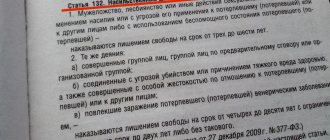The process aimed at personality formation consists of training, socialization, and upbringing. In a situation where one of the listed elements is presented as defective, the personality may become inferior or have deviations from the norm. One of the main aspects is a person’s sexual behavior, his sexual preferences, and sexual liberation.
These directions can be influenced by actions committed by adults whose goal is to seduce minors. As a result, deviant behavior occurs, which can be reflected in a tendency towards perverted inclinations, prostitution and other actions. In this regard, an article of the Criminal Code of the Russian Federation has been developed for indecent acts of a sexual nature.
What is considered lewd acts
According to the Resolution of the Plenum of the Supreme Court of the Russian Federation dated December 4, 2014 N 16 “In cases of crimes against sexual integrity and sexual freedom of the individual,” the number of depraved acts reflected in Article 135 of the Criminal Code of the Russian Federation includes all activities, with the exception of sexual intercourse, lesbianism and sodomy.
Such actions are carried out in relation to persons who have reached the age of twelve, but have not yet reached the age of sixteen. Actions are aimed at:
- satisfying the sexual desire of the attacker;
- causing sexual arousal in the injured party;
- to awaken interest in relationships that have a sexual orientation.
Attention!
Those where there was no direct physical contact with the victim’s body can be recognized as lewd acts. This also includes actions that are performed using the Internet, as well as other networks with an information and telecommunications focus.
Download for viewing and printing:
Resolution of the Plenum of the Supreme Court of the Russian Federation of December 4, 2014 N 16
Article 135 of the Criminal Code of the Russian Federation “Depraved acts”
Compound
The act in question is considered completed when the commission of actions of a depraved nature has begun. The crime is classified as a crime of medium gravity.
An object
The object of the crime under consideration is the normal sexual and moral development of persons under sixteen years of age. The face can be either female or male.
Objective side
The objective side is expressed in the form of active activity, which consists of committing acts of a depraved nature, without using violence against the victim who was under the age of 16 at the time of the commission of the act.
Depraved actions include those that are of a sexual nature and aimed at satisfying the sexual needs of the guilty person or arousing sexual passion in a minor. Actions under consideration could:
- involve physical contact, that is, when the perpetrator touches the victim’s genitals;
- be intellectual, that is, pornographic materials, cynical conversations, etc. are shown.
Subject
The subject is characterized as a physically sane person who has reached the age of eighteen. It is worth noting that the culprit can be either male or female.
Subjective side
The subjective side is characterized by direct intent. This means that the perpetrator is fully aware that he is committing depraved acts without the use of violence against a person who at the time of the commission was under the age of 16 years.
Also, the culprit wants to commit such actions.
Specifics of the crime
Violent actions of a sexual nature are non-standard ways of satisfying natural human needs that were obtained after voicing threats or violent actions.
There are several types of crimes of a sexual nature, among which NDHS is particularly dangerous to the public. The reasons for this are a large percentage of secrecy and the lack of receipt of applications from victims to law enforcement agencies, which is caused by the following reasons:
- Lack of faith in the possibility of bringing the criminal to justice.
- Fear of publicity.
- Fear of condemnation from society. Similar fears are common among male victims.
Qualifying features
Signs that have qualifying significance are provided for in parts 2-5 of Article 135 of the Criminal Code of the Russian Federation.
Part two talks about committing indecent acts against a person who has reached the age of twelve, but at the same time has not reached the age of fourteen. Part three establishes liability for unlawful actions committed against two or more persons.
The act in this case is expressed in the commission of depraved acts without the use of violence by a person who has reached the age of eighteen, in relation to a person under the age of sixteen, or if these actions are committed in relation to a person who has reached the age of twelve, but has not reached the age of fourteen.
Part 4 provides for the commission of depraved acts by a group of persons by prior conspiracy or by an organized group. Part 5 deals with committing indecent acts against a person who has reached 12 years of age, but has not reached 16 years of age. The subject in this case is a person who has a criminal record for a previously committed crime against the sexual integrity of a minor.
Actions of a depraved nature, committed against two or more persons, can be committed at the same time, or have temporary intervals . This suggests that the behavior of the perpetrator is considered as a set of acts.
Preliminary conspiracy implies that the members of the group united in advance to commit depraved acts.
Important! It does not matter how long the group has existed, that is, the association could have occurred immediately before the commission of the criminal act.
An organized group is stable in nature and is created to carry out one or more clearly planned acts.
Rape
Rape
(Article 131 of the Criminal Code).
The object
of the crime is sexual integrity and sexual freedom of the individual; additional - human life and health. Only female victims can be victims of rape.
Objective side
Rape is characterized by sexual intercourse between a man and a woman, committed against her will, with the use of violence or the threat of its use, or taking advantage of the helpless state of the victim.
Sexual intercourse should be understood as sexual intercourse in a natural form. Satisfaction of sexual desire in other, so-called perverted forms using the same methods is subject to qualification under Art. 132 of the Criminal Code. Sexual intercourse during rape must occur against the will of the victim, therefore in all cases it should be established whether the woman really did not want to have sexual intercourse.
So, Ya., having come to K.’s apartment in the evening, where he temporarily lived, invited 18-year-old Olga K. to have sexual intercourse with him. The latter agreed, but later got scared and told her mother about everything, who persuaded her daughter to file an application with the prosecutor's office to bring Ya. to justice for rape. Of course, there is no crime in Ya’s actions, since the sexual relationship was mutually voluntary.
The law names methods of rape as mandatory signs of the objective side of the crime. This is the use of violence, threats of its use, or taking advantage of the helpless state of the victim. As follows from the text of Art. 131 of the Criminal Code, violence and threats of its use can be addressed not only to the woman - the direct victim of rape, but also to other persons, whose circle is not limited by law. These could be her relatives, people close to her, as well as other persons against whom threats against the perpetrators can break a woman’s resistance.
Violence under Part 1 of Art. 131 of the Criminal Code can be expressed in beatings, causing minor or moderate harm to a person’s health, tying up the victim, or rendering him unconscious. Additional qualifications under Art. 112 and 115 of the Criminal Code are not required.
The content of the threat is limited by law only to the promise to immediately use physical violence against the victim or other persons. If the content of the threat is different, for example, to defame the victim or destroy her property, the act should be regarded as coercion to acts of a sexual nature (Article 133 of the Criminal Code). If the perpetrator promises to use violence in the future and the woman, fearing his execution, agrees to have sexual intercourse, there is no element of rape. The threat must be real and real.
The use of a helpless state involves the rape of a victim who, due to certain circumstances, is unable, for example, serious illness, physical disabilities, old age, to resist the perpetrator (physical helplessness) or to understand what is happening to her, for example, as a result of mental illness, being a minor, unconsciousness, etc. (mental helplessness).
The state of alcohol or drug intoxication can be recognized as a helpless state only if its degree was such that it deprived the victim of the opportunity to be aware of the surrounding situation, understand the meaning of the actions committed by the offender or resist him (clause 5 of the resolution of the Plenum of the Supreme Court of the Russian Federation “On judicial practice in cases of rape "dated April 22, 1992. For the qualification of the act, it does not matter whether the perpetrator brought the victim into a helpless state or she was helpless regardless of his actions. When using the helpless state, it is necessary to establish that the perpetrator was aware of the helplessness of the victim, otherwise he will not may be prosecuted for rape.
If a person, wanting to have sexual intercourse with a woman, uses other methods of influencing her (for example, deception - a deliberately false promise to subsequently formalize a marriage relationship with her), there is no element of rape.
The crime is considered completed from the moment the sexual intercourse begins, regardless of whether the sexual intercourse was completed by the perpetrator in the physiological sense.
From the subjective side
the crime is characterized by guilt in the form of direct intent.
The subject
is a physically sane male person who has reached the age of 14.
Part 2 Art. 131 of the Criminal Code provides for liability for the following qualified types of rape:
a) committed repeatedly (same repetition) or by a person who has previously committed violent acts of a sexual nature (same repetition); Repeated rape must be distinguished from continued rape. If the commission of several violent sexual acts with the victim is carried out with a small gap in time and was covered by the single intent of the perpetrator, there is no sign of repetition;
b) committed by a group of persons, a group of persons by prior conspiracy or an organized group. Rape is qualified as committed by a group when the persons who took part in it acted in concert against the victim without entering into a prior criminal conspiracy, and co-perpetrators of rape are not only persons who committed a violent sexual act, but also those who contributed to this through the use of physical or mental violence to the victim. When rape is committed by a group of persons by prior conspiracy, an agreement between the participants in the crime to commit it must take place before the start of the criminal act. At the same time, the actions of organizers, instigators, and accomplices should be qualified with reference to Article 33 of the Criminal Code. Organized group rape occurs when it is committed by a stable group of individuals who have previously united to commit one or more rapes.
If rape is committed by a group consisting of two persons, one of whom cannot be the subject of rape due to, for example, not reaching the age of criminal responsibility or insanity, the actions of the other should be qualified as committed by a group of persons.
So, for committing gang rape under Part 3 of Art. 117 of the Criminal Code (now clause “b”, part 2 of Article 131 of the Criminal Code) T was convicted. The crime was committed under the following circumstances. A., being heavily intoxicated, returning home from a neighboring village, fell at a railway crossing. T. and 13-year-old U. picked her up and took her along the road to the village. On the way, T. had the intention of taking advantage of her helpless state and performing sexual intercourse with A. He informed U. of his intention and received the latter’s consent to jointly commit the act. They took A. to a haystack, undressed her, and T. had sexual intercourse with her. U. also tried to have sexual intercourse with A., but for physiological reasons he was unable to carry out his intention.
c) accompanied by a threat of murder or infliction of grievous bodily harm, as well as committed with particular cruelty towards the victim or other persons. The threat of murder or infliction of grievous bodily harm is understood as direct statements expressing the intention to immediately use physical violence of appropriate intensity and nature against the victim or other persons, but also other threatening actions of the perpetrator, for example, a demonstration of weapons. The threat must be perceived by the victim as realistically feasible, and immediately. In the case of statements of an unspecified nature, in order to assess their content, it is necessary to find out all the circumstances, the environment in which they were expressed, as well as the perception of such threats by the victims. Particular cruelty, as noted above, is a legal category that characterizes the method of committing a criminal act. It means such an impact on the victim that entails causing him special physical or moral suffering (for example, the manifestation of sadism towards the victim). The perpetrator is aware that he is using particularly cruel methods of influence towards the victim or other persons, thereby causing them special suffering; d) resulting in infection of the victim with a venereal disease. To impute this type of rape, it is necessary to establish the existence of a causal connection between the rape and the resulting harmful consequence in the form of the victim contracting a venereal disease, as well as the awareness of the perpetrator of the presence of this disease; e) rape of a known minor. In the situation under consideration, the victim is a girl aged 14 to 18 years. The culprit is liable under clause “d”, part 2 of Art. 131 of the Criminal Code, provided that he reliably knew about the minority of the victim, as the law directly indicates, using the term “knowingly”.
The law classifies rape as particularly qualified if it negligently resulted in the death of the victim (clause “a”, Part 3, Article 131 of the Criminal Code); which, through negligence, resulted in the infliction of serious harm to the health of the victim, her infection with HIV infection or other grave consequences (clause “b”, part 3 of article 131 of the Criminal Code); as well as rape of a victim who is known to be under 14 years of age (clause “c” of Part 3 of Article 131 of the Criminal Code).
The elements of the crime provided for in paragraph “a” of Part 3 of Art. 131 of the Criminal Code, covers causing the victim’s death by negligence. The murder of the victim requires additional qualification under paragraph “k” of Part 2 of Art. 105 of the Criminal Code. Moreover, if the murder was committed during rape, the actions of the perpetrator must be qualified under paragraph “b” of Part 3 of Art. 131 as rape resulting in grave consequences, and paragraph “k” of Part 2 of Art. 105 of the Criminal Code. If the murder was committed after rape in order to conceal the crime or for reasons of revenge for the resistance offered by the victim during forced sexual intercourse, the actions of the perpetrator should be qualified under paragraph “k” of Part 2 of Art. 105 of the Criminal Code and the relevant part of Art. 131 CC.
Reckless death in rape must be the result of the actions of the perpetrator, i.e. must be in a causal relationship with them. The same requirement also applies to the description of rape, which through negligence resulted in the infliction of grievous harm to the health of the victim.
The subjective attitude of the perpetrator to the fact of death or serious harm to health in the situations under consideration appears in the form of negligence, in the form of frivolity or negligence. Intentional infliction of grievous harm, as well as murder, requires additional qualification under the relevant part of Art. 111 of the Criminal Code.
Other grave consequences of rape are an evaluative concept, a question of fact that is decided by the court in each specific situation of the commission of the act in question. But in any case, the consequences recognized by the court as grave must be in a causal connection with the rape committed. Such consequences should include, in particular, the suicide of the victim, mental illness resulting from rape, the death of the victim that occurred in the process of her attempt to avoid sexual violence by the perpetrator.
Thus, the presence of a grave consequence can be stated in the following situation: after she was raped by two criminals, S., fleeing from new violence on their part, tried to get out of the apartment on the sixth floor in which the crime was committed using the fire escape. However, being greatly weakened as a result of the injuries caused to her, she fell and fell to her death.
Infection of the victim with HIV infection can qualify rape, provided that it was in a causal connection with forced sexual intercourse and that the perpetrator was aware of the presence of this disease.
Imputation of the sign provided for in paragraph “c” of Part 3 of Art. 131 of the Criminal Code, perhaps if the perpetrator reliably knew that the victim was under 14 years of age. A conscientious misconception by the perpetrator regarding the age of the victim excludes liability, taking into account the qualifying feature under consideration.
Distinction from other crimes
Article 135 of the Criminal Code of the Russian Federation provides for liability for committing indecent acts without the use of violence. In practice, depraved actions include:
- aimed at demonstrating genitals in front of minors;
- touching the organs of the child’s reproductive system;
- engaging in sexual intercourse or masturbation in the presence of a minor.
If a situation occurs when the hymen is ruptured while touching the child’s genitals, the offense falls within this category and is not subject to additional assessment under other provisions of the Criminal Code of the Russian Federation.
Important! If indecent acts were committed before rape, sexual assault, sexual intercourse or other sexual acts with a person under 14 years of age, the assessment is given under other articles of the Criminal Code of the Russian Federation.
A significant difference between indecent acts against a minor and other criminal acts of a sexual nature is that there is no violence against the injured party. In addition, the victim may express consent to commit such actions.
This is due to the fact that children are naturally curious about the world around them. This circumstance may push a teenager to participate in the actions in question.
Actions can progress from simply observing such actions being performed to touching the genitals of the person committing seductive acts, stroking and touching the genitals. This can end in full sexual intercourse, with no violence.
Possible punishment
There are not many articles in the current Criminal Code that provide for the possibility of imposing life imprisonment for a crime committed under aggravating circumstances, including Art. 132.
It provides only real sentences, which can vary from 3 to 20 years. As an additional punishment, an attacker for other violent actions may be given one of the following measures:
- A ban on the ability to officially carry out certain types of activities.
- After the full serving of the sentence, restriction of freedom is imposed for a certain period.
In theory, there are circumstances that should mitigate the punishment. They relate exclusively to the act committed, and not to the identity of the criminal. In practice, the court accepts a mitigating circumstance when determining punishment for such crimes only in exceptional cases.
Release from liability
The note to Article 134 of the Criminal Code of the Russian Federation states that if the age of the perpetrator and the victim differs by less than 4 years, the former is not subject to imprisonment.
This rule applies to the corpus delicti provided for in Part 1 of Article 135 of the Criminal Code of the Russian Federation. Also, the expiration of the statute of limitations serves as a basis for exemption from liability. They are enshrined in Article 78 of the Criminal Code of the Russian Federation.
Part 1 of Article 135 of the Criminal Code of the Russian Federation refers to crimes of minor gravity, the statute of limitations in this case is 2 years. Part 2 refers to moderate severity - the statute of limitations in this case is 6 years. Parts 3, 4 and 5 are particularly serious and the statute of limitations is fifteen years.
The specified period begins to run from the moment the unlawful act is committed and until the court verdict enters into legal force. When a person commits a new crime, the statute of limitations for it is considered separately.
Download for viewing and printing:
Article 134 of the Criminal Code of the Russian Federation “Sexual intercourse and other actions of a sexual nature with a person under sixteen years of age”
Article 78 of the Criminal Code of the Russian Federation “Exemption from criminal liability due to the expiration of the statute of limitations”
Arbitrage practice
As an example of the article under consideration, we can cite the sentence passed by the court of the city of Naberezhnye Chelny.
During the court hearing, it was established that citizen N., with the goal of committing lewd acts, exposed his genitals in front of M., who at the time of the commission of this act had not reached the age of 12 years. Through this action, M. suffered moral harm.
N. admitted his guilt in full in court. Guilt was proven through the testimony of the victim, her legal representative, and witnesses. The judge qualified the act under Part 3 of Article 135 of the Criminal Code of the Russian Federation as the commission of indecent acts without the use of violence by a person who has reached the age of eighteen, committed against a person known to be under the age of twelve.
The sentence imposed a sentence of imprisonment for a period of 3 years to be served in a general regime correctional colony.








